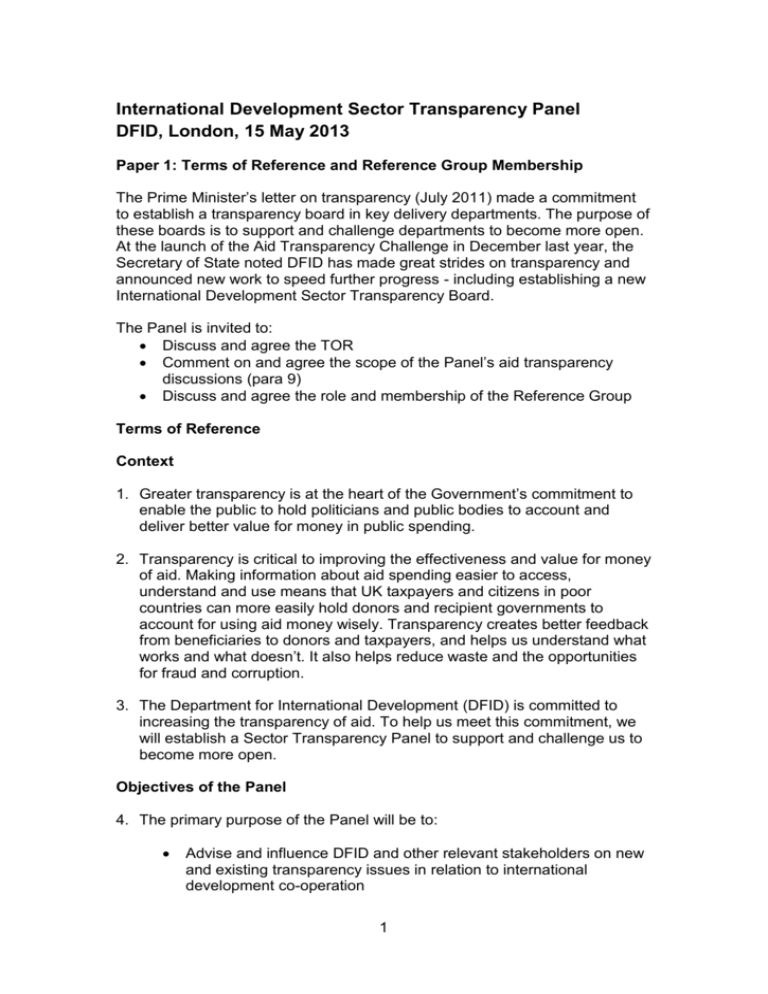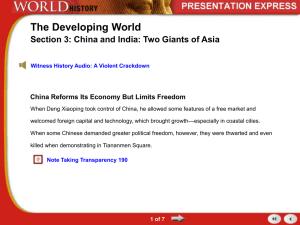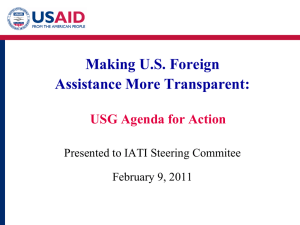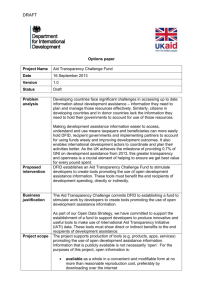International Development Sector Transparency Panel
advertisement

International Development Sector Transparency Panel DFID, London, 15 May 2013 Paper 1: Terms of Reference and Reference Group Membership The Prime Minister’s letter on transparency (July 2011) made a commitment to establish a transparency board in key delivery departments. The purpose of these boards is to support and challenge departments to become more open. At the launch of the Aid Transparency Challenge in December last year, the Secretary of State noted DFID has made great strides on transparency and announced new work to speed further progress - including establishing a new International Development Sector Transparency Board. The Panel is invited to: Discuss and agree the TOR Comment on and agree the scope of the Panel’s aid transparency discussions (para 9) Discuss and agree the role and membership of the Reference Group Terms of Reference Context 1. Greater transparency is at the heart of the Government’s commitment to enable the public to hold politicians and public bodies to account and deliver better value for money in public spending. 2. Transparency is critical to improving the effectiveness and value for money of aid. Making information about aid spending easier to access, understand and use means that UK taxpayers and citizens in poor countries can more easily hold donors and recipient governments to account for using aid money wisely. Transparency creates better feedback from beneficiaries to donors and taxpayers, and helps us understand what works and what doesn’t. It also helps reduce waste and the opportunities for fraud and corruption. 3. The Department for International Development (DFID) is committed to increasing the transparency of aid. To help us meet this commitment, we will establish a Sector Transparency Panel to support and challenge us to become more open. Objectives of the Panel 4. The primary purpose of the Panel will be to: Advise and influence DFID and other relevant stakeholders on new and existing transparency issues in relation to international development co-operation 1 Help inform the UK’s international work on aid transparency and the work of others in this area Inform and advise on the development of DFID’s Open Data Strategy Improve DFID’s understanding of the use and benefits of aid information for beneficiaries and the UK public Support the work of the Public Sector Transparency Board by providing an international development perspective to the Government’s transparency commitments. 5. The Panel will seek to challenge, influence and advise on DFID’s approach to international development transparency. It will recommend actions that should be taken forward by the UK Government generally (through the Public Sector Transparency Board), by DFID specifically and by its delivery partners. Scope 6. Sharing sensitive data about identifiable people with third parties and information which could compromise national security are not in the scope of our definition of open data, or the Panel’s discussions. 7. We recognise that releasing greater amounts of anonymised open data raises complex questions about how to protect privacy. A privacy expert will be invited to join Panel discussions when data releases are being considered to assist the Panel in ensuring that transparency does not erode privacy. 8. The Panel will steer policy and cultural change within DFID, and advise and influence as far as possible the Department’s delivery partners and private sector relationships. 9. Initially, the Panel will focus on aid transparency rather than broader transparency issues, such as extractives, tax, land, etc. Subsequent meetings could focus on specific broader transparency issues, as desired. Success measures 10. Key outputs in which the Panel is expected to have a role include: Improving data quality, comparability and accessibility for a range of stakeholders including beneficiaries, donors, charities, activists, journalists and researchers Linking DFID with partner country aid data Encouraging partner country transparency Using technology to support people in poor countries and the UK public to track and assess aid impact Traceability through the aid chain, from source to beneficiary Developing tools that make innovative use of aid data 2 Helping to shape and challenge the further development of DFID’s Open Data Strategy to ensure commitments are relevant and stretching Increasing the evidence base on use and benefits of open international development data. Membership and Chair 11. As a minimum, we expect the Panel to include: A Departmental senior official lead on open data A member of the Public Sector Transparency Board, Rufus Pollock A member of the Cabinet Office Transparency team The relevant Number 10 official An open data policy perspective: Owen Barder, Centre for Global Development David Hall-Matthews, Publish What You Fund An open data activist: Fran Perrin, Indigo Trust Mary-Anne Addo, Ghana A privacy expert (tbc) The panel will be chaired by Liz Ditchburn, DFID. Governance 12. The Panel will generate ideas and a set of actions and recommendations for DFID to consider in developing its Open Data Strategy. 13. Members will be asked to declare any conflict of interest at the start of each meeting and to remove themselves from a discussion if it leads to a conflict of interest. 14. The Panel will operate an open policy by default, allowing panel members to share papers and discuss its work within communities. On occasion, it may be necessary to agree that a meeting, or part of a meeting, is held under the Chatham House Rule. The rule may be applied in situations where the Panel dicusses information that may harm international relations and security and safety, for example. Panel minutes will be published on the GOV.UK website. Secretariat 15. DFID will provide limited secretariat support, in the form of assisting the Chair in organising and hosting meetings, helping to co-ordinate meeting agendas, circulating papers and taking meeting minutes. It will also provide a link between the Panel and central government. 16. DFID will pay expenses in exceptional circumstances. 3 Frequency and duration 17. The Panel will meet periodically, perhaps meeting 3-4 times per year. Meetings will be held in DFID London or East Kilbride. Attendance by phone or VC will be possible for those unable to attend in person. Review arrangements 18. The Panel will report progress regularly to the Public Sector Transparency Board, with a review of the model after 2 years. 4 Reference group – role and membership While the Panel must include appointees with the necessary professional expertise, we aim to limit numbers to twelve maximum to facilitate proper discussion and decision making. We will maintain a wider Reference Group list to provide informed opinion and guidance to the Panel across the range of fields relevant to aid transparency. Specialists from these fields will be invited to attend meetings as appropriate. 5








